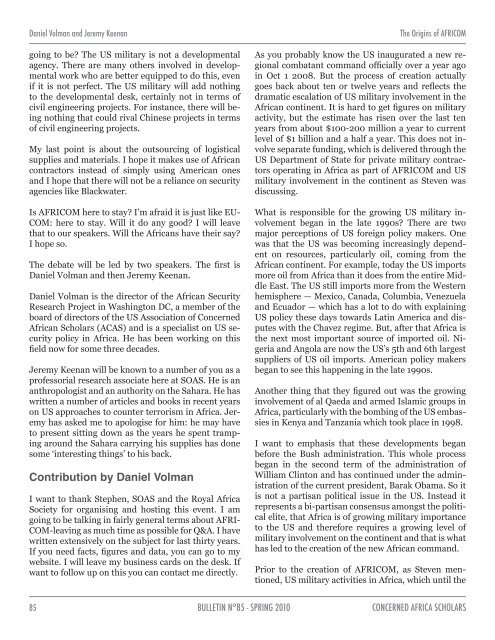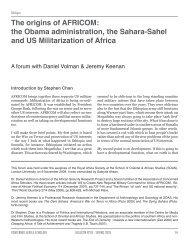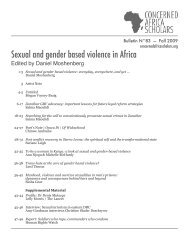Western Sahara and the United States' geographical imaginings
Western Sahara and the United States' geographical imaginings
Western Sahara and the United States' geographical imaginings
You also want an ePaper? Increase the reach of your titles
YUMPU automatically turns print PDFs into web optimized ePapers that Google loves.
Daniel Volman <strong>and</strong> Jeremy Keenan The Origins of AFRICOM<br />
going to be? The US military is not a developmental<br />
agency. There are many o<strong>the</strong>rs involved in developmental<br />
work who are better equipped to do this, even<br />
if it is not perfect. The US military will add nothing<br />
to <strong>the</strong> developmental desk, certainly not in terms of<br />
civil engineering projects. For instance, <strong>the</strong>re will being<br />
nothing that could rival Chinese projects in terms<br />
of civil engineering projects.<br />
My last point is about <strong>the</strong> outsourcing of logistical<br />
supplies <strong>and</strong> materials. I hope it makes use of African<br />
contractors instead of simply using American ones<br />
<strong>and</strong> I hope that <strong>the</strong>re will not be a reliance on security<br />
agencies like Blackwater.<br />
Is AFRICOM here to stay? I’m afraid it is just like EU-<br />
COM: here to stay. Will it do any good? I will leave<br />
that to our speakers. Will <strong>the</strong> Africans have <strong>the</strong>ir say?<br />
I hope so.<br />
The debate will be led by two speakers. The first is<br />
Daniel Volman <strong>and</strong> <strong>the</strong>n Jeremy Keenan.<br />
Daniel Volman is <strong>the</strong> director of <strong>the</strong> African Security<br />
Research Project in Washington DC, a member of <strong>the</strong><br />
board of directors of <strong>the</strong> US Association of Concerned<br />
African Scholars (ACAS) <strong>and</strong> is a specialist on US security<br />
policy in Africa. He has been working on this<br />
field now for some three decades.<br />
Jeremy Keenan will be known to a number of you as a<br />
professorial research associate here at SOAS. He is an<br />
anthropologist <strong>and</strong> an authority on <strong>the</strong> <strong>Sahara</strong>. He has<br />
written a number of articles <strong>and</strong> books in recent years<br />
on US approaches to counter terrorism in Africa. Jeremy<br />
has asked me to apologise for him: he may have<br />
to present sitting down as <strong>the</strong> years he spent tramping<br />
around <strong>the</strong> <strong>Sahara</strong> carrying his supplies has done<br />
some ‘interesting things’ to his back.<br />
Contribution by Daniel Volman<br />
I want to thank Stephen, SOAS <strong>and</strong> <strong>the</strong> Royal Africa<br />
Society for organising <strong>and</strong> hosting this event. I am<br />
going to be talking in fairly general terms about AFRI-<br />
COM-leaving as much time as possible for Q&A. I have<br />
written extensively on <strong>the</strong> subject for last thirty years.<br />
If you need facts, figures <strong>and</strong> data, you can go to my<br />
website. I will leave my business cards on <strong>the</strong> desk. If<br />
want to follow up on this you can contact me directly.<br />
85<br />
BULLETIN N°85 - SPRING 2010<br />
As you probably know <strong>the</strong> US inaugurated a new regional<br />
combatant comm<strong>and</strong> officially over a year ago<br />
in Oct 1 2008. But <strong>the</strong> process of creation actually<br />
goes back about ten or twelve years <strong>and</strong> reflects <strong>the</strong><br />
dramatic escalation of US military involvement in <strong>the</strong><br />
African continent. It is hard to get figures on military<br />
activity, but <strong>the</strong> estimate has risen over <strong>the</strong> last ten<br />
years from about $100-200 million a year to current<br />
level of $1 billion <strong>and</strong> a half a year. This does not involve<br />
separate funding, which is delivered through <strong>the</strong><br />
US Department of State for private military contractors<br />
operating in Africa as part of AFRICOM <strong>and</strong> US<br />
military involvement in <strong>the</strong> continent as Steven was<br />
discussing.<br />
What is responsible for <strong>the</strong> growing US military involvement<br />
began in <strong>the</strong> late 1990s? There are two<br />
major perceptions of US foreign policy makers. One<br />
was that <strong>the</strong> US was becoming increasingly dependent<br />
on resources, particularly oil, coming from <strong>the</strong><br />
African continent. For example, today <strong>the</strong> US imports<br />
more oil from Africa than it does from <strong>the</strong> entire Middle<br />
East. The US still imports more from <strong>the</strong> <strong>Western</strong><br />
hemisphere — Mexico, Canada, Columbia, Venezuela<br />
<strong>and</strong> Ecuador — which has a lot to do with explaining<br />
US policy <strong>the</strong>se days towards Latin America <strong>and</strong> disputes<br />
with <strong>the</strong> Chavez regime. But, after that Africa is<br />
<strong>the</strong> next most important source of imported oil. Nigeria<br />
<strong>and</strong> Angola are now <strong>the</strong> US’s 5th <strong>and</strong> 6th largest<br />
suppliers of US oil imports. American policy makers<br />
began to see this happening in <strong>the</strong> late 1990s.<br />
Ano<strong>the</strong>r thing that <strong>the</strong>y figured out was <strong>the</strong> growing<br />
involvement of al Qaeda <strong>and</strong> armed Islamic groups in<br />
Africa, particularly with <strong>the</strong> bombing of <strong>the</strong> US embassies<br />
in Kenya <strong>and</strong> Tanzania which took place in 1998.<br />
I want to emphasis that <strong>the</strong>se developments began<br />
before <strong>the</strong> Bush administration. This whole process<br />
began in <strong>the</strong> second term of <strong>the</strong> administration of<br />
William Clinton <strong>and</strong> has continued under <strong>the</strong> administration<br />
of <strong>the</strong> current president, Barak Obama. So it<br />
is not a partisan political issue in <strong>the</strong> US. Instead it<br />
represents a bi-partisan consensus amongst <strong>the</strong> political<br />
elite, that Africa is of growing military importance<br />
to <strong>the</strong> US <strong>and</strong> <strong>the</strong>refore requires a growing level of<br />
military involvement on <strong>the</strong> continent <strong>and</strong> that is what<br />
has led to <strong>the</strong> creation of <strong>the</strong> new African comm<strong>and</strong>.<br />
Prior to <strong>the</strong> creation of AFRICOM, as Steven mentioned,<br />
US military activities in Africa, which until <strong>the</strong><br />
CONCERNED AFRICA SCHOLARS




